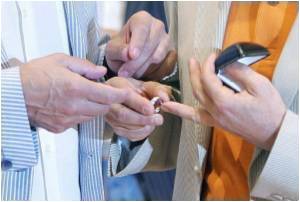More than 1.7 million people are registered to cast their ballots on the issue of gay marriage which has stoked heated debate in this former Yugoslav republic.

‘In March, Slovenia's parliament approved homosexual couples the same rights as their heterosexual counterparts, but opponents immediately launched a campaign to reverse the changes.’





In March, Slovenia's parliament approved legislation redefining marriage as a "union of two" instead of being a "union of a man and a woman", granting homosexual couples the same rights as their heterosexual counterparts, including the right to adopt children. But opponents immediately launched a campaign to reverse the changes, meaning the legislation never came into force and no same-sex couples were able to tie the knot. A group called "Children Are At Stake" managed to gather the 40,000 signatures necessary to force a referendum on the matter.
"I voted yes. Love is love, regardless of everything," said a 24-year-old woman called Ida. Another voter said he was also in favour of the changes, but argued that putting the matter to a referendum was a waste of public money.
"It should be experts or the government deciding about this. They should not leave it to us," said Vojko, a pensioner. "This is throwing money away. Of course I'm for it, but if it turns out to be a 'no', the world will laugh at us."
- A divisive issue -
Graffiti scrawled on the wall of a church centre near the polling station gave some kind of indication of the sharp divisions over the issue.
"Would you take a homosexual donor's blood to save your child?" it asked. Ahead of the vote debate has been heated, and even Pope Francis has waded in, urging Slovenians to "support the family, a structural reference point for the life of society".
A final poll released by state television on Friday gave the "No" vote 55.5 percent support, with a projected turnout of 46 percent. In order for the result to be valid, the winning side must include at least 20 percent of eligible voters. Other surveys have indicated a tighter result, however.
If the "No" vote prevails, then the civil code will be changed back, although existing legislation, which allows registered civil partnerships but not the adoption of children, will remain in force.
This is not the first such referendum on the subject, with Slovenian voters rejecting gay marriage in an earlier plebiscite in 2012, although turnout was low. Polls close at 9:00 pm (2000 GMT), with preliminary results are expected shortly afterwards.
- Genderless marriage? -
Slovenia has long been ahead of its peers, joining the EU back in 2004 -- nine years before neighbour Croatia -- and the eurozone in 2007 as its first ex-communist member, but its society retains a strong traditionalist streak.
President Borut Pahor and Prime Minister Miro Cerar's ruling Modern Centre Party (SMC) support the "Yes" camp, saying gay marriage would eliminate discrimination and grant equal rights to all citizens in the two-million-strong country.
"At this referendum we're deciding what kind of Slovenia we want to live in," Nika Kovac, a coordinator from the "Cas je Za" (It's time For a Yes) campaign group, told AFP. "We'll decide whether we want to join the developed world."
Janez Jansa, the former centre-right prime minister from the opposition Slovenian Democratic Party (SDS), strongly disagreed. "Erasing the gender from the marriage (definition) gives ground to human rights' violations against our most precious -- our children," Jansa said.
Source-AFP











